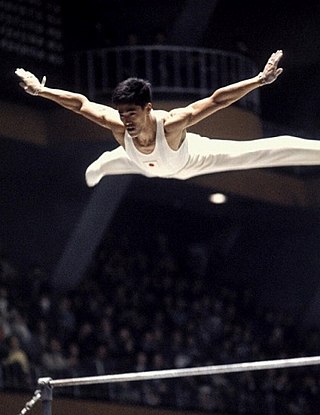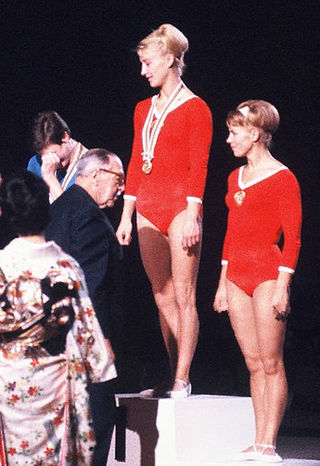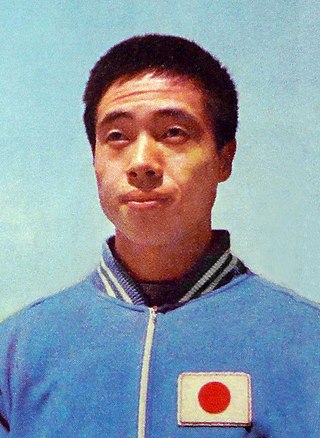| Gymnastics at the 1964 Summer Olympics | ||
|---|---|---|
| List of gymnasts | ||
| Artistic | ||
| Team all-around | men | women |
| Individual all-around | men | women |
| Vault | men | women |
| Floor | men | women |
| Pommel horse | men | |
| Rings | men | |
| Parallel bars | men | |
| Horizontal bar | men | |
| Uneven bars | women | |
| Balance beam | women | |
The men's team competition was a gymnastics event contested as part of the Gymnastics at the 1964 Summer Olympics programme at the Tokyo Metropolitan Gymnasium.
The score for the team was a sum of its 6 members best scores. In each of the 6 apparatuses, the top 5 scores in each category (compulsory and optional) were summed, for a total of 12 categories. 600 points were possible.
| Rank | Country | C | V | C | V | C | V | C | V | C | V | C | V | Total Points |
|---|---|---|---|---|---|---|---|---|---|---|---|---|---|---|
| | 48.00 | 48.10 | 47.80 | 47.90 | 48.25 | 48.15 | 48.25 | 48.35 | 48.40 | 48.35 | 48.30 | 48.10 | 577.95 | |
| | 47.85 | 47.95 | 47.20 | 47.20 | 47.90 | 48.15 | 48.15 | 48.25 | 48.25 | 48.05 | 48.20 | 48.40 | 575.45 | |
| | 47.05 | 47.15 | 47.45 | 47.05 | 46.45 | 47.35 | 45.95 | 48.05 | 47.20 | 47.55 | 46.60 | 47.25 | 565.10 | |
| 4. | 45.95 | 46.90 | 46.00 | 46.65 | 46.60 | 47.05 | 46.40 | 47.50 | 47.50 | 47.45 | 46.25 | 46.65 | 560.90 | |
| 5. | 46.55 | 47.10 | 46.45 | 44.65 | 46.20 | 46.35 | 47.40 | 47.20 | 47.05 | 46.30 | 46.95 | 47.30 | 559.50 | |
| 6. | 45.95 | 46.50 | 45.05 | 46.55 | 45.85 | 46.60 | 46.85 | 47.80 | 46.80 | 47.15 | 46.40 | 46.65 | 558.15 | |
| 7. | 45.50 | 46.80 | 46.35 | 46.00 | 46.30 | 46.70 | 46.65 | 47.55 | 46.70 | 46.10 | 46.20 | 46.10 | 556.95 | |
| 8. | 46.60 | 47.25 | 46.50 | 46.20 | 44.35 | 45.25 | 47.15 | 47.70 | 46.30 | 47.00 | 46.10 | 45.80 | 556.20 | |
| 9. | 46.35 | 45.30 | 45.60 | 45.10 | 45.70 | 45.90 | 47.05 | 47.30 | 46.80 | 46.60 | 46.95 | 47.05 | 555.70 | |
| 10. | 45.20 | 46.40 | 45.80 | 45.80 | 45.40 | 46.05 | 46.25 | 47.45 | 46.25 | 46.30 | 46.90 | 47.15 | 555.65 | |
| 11. | 45.35 | 45.35 | 46.25 | 46.20 | 45.45 | 46.25 | 46.70 | 47.15 | 46.80 | 46.50 | 46.80 | 46.00 | 554.80 | |
| 12. | 45.95 | 45.95 | 45.50 | 45.15 | 44.50 | 45.80 | 46.55 | 47.45 | 46.25 | 46.55 | 44.90 | 46.10 | 550.65 | |
| 13. | 45.20 | 46.45 | 45.10 | 44.90 | 45.05 | 44.55 | 45.95 | 47.00 | 46.45 | 46.00 | 46.30 | 46.55 | 549.50 | |
| 14. | 45.30 | 44.55 | 45.75 | 45.95 | 42.15 | 43.60 | 47.30 | 47.90 | 46.65 | 46.50 | 44.60 | 45.90 | 546.15 | |
| 15. | 44.75 | 44.30 | 42.60 | 39.90 | 41.45 | 43.20 | 45.95 | 46.30 | 43.85 | 44.55 | 42.00 | 44.10 | 522.95 | |
| 16. | 43.00 | 43.20 | 41.25 | 41.55 | 38.70 | 40.75 | 46.05 | 45.65 | 43.00 | 44.55 | 41.45 | 42.85 | 512.00 | |
| 17. | 42.35 | 42.65 | 32.15 | 30.45 | 40.60 | 41.15 | 45.40 | 44.60 | 42.75 | 44.70 | 42.25 | 44.00 | 493.05 | |
| 18. | 40.70 | 40.10 | 35.70 | 30.50 | 31.80 | 36.45 | 42.95 | 43.75 | 33.85 | 37.25 | 28.15 | 27.15 | 428.35 |

At the 1964 Summer Olympics, fourteen different artistic gymnastics events were contested, eight for men and six for women. All events were held at the Tokyo Metropolitan Gymnasium in Tokyo from 18 October through 23 October.
The men's floor exercise was a gymnastics event contested as part of the Gymnastics at the 1964 Summer Olympics programme at the Tokyo Metropolitan Gymnasium.

The men's pommel horse was a gymnastics event contested as part of the Gymnastics at the 1964 Summer Olympics programme at the Tokyo Metropolitan Gymnasium. The event was held on 18, 20, and 22 October. There were 128 competitors from 29 nations, with nations in the team competition having up to 6 gymnasts and other nations entering up to 3 gymnasts. The event was won by Miroslav Cerar of Yugoslavia, the nation's first medal in the pommel horse. Silver went to Shuji Tsurumi of Japan, the third man to win multiple medals in the event. Yury Tsapenko of the Soviet Union took bronze, breaking a three-Games gold medal streak for the Soviets.

The men's rings was a gymnastics event contested as part of the Gymnastics at the 1964 Summer Olympics programme at the Tokyo Metropolitan Gymnasium. The event was held on 18, 20, and 22 October. There were 128 competitors from 29 nations, with nations in the team competition having up to 6 gymnasts and other nations entering up to 3 gymnasts. The event was won by Takuji Hayata of Japan, the nation's first victory in the rings after two Games with bronze medals. Silver went to Franco Menichelli of Italy, the nation's first rings medal since 1932. Boris Shakhlin of the Soviet Union took bronze, breaking a three-Games gold medal streak for the Soviets. Shakhlin was the fourth man to win multiple medals in the rings, adding to his 1960 silver.

The men's vault was a gymnastics event contested as part of the Gymnastics at the 1964 Summer Olympics programme at the Tokyo Metropolitan Gymnasium. The event was held on 18, 20, and 23 October. There were 130 competitors from 30 nations, with nations in the team competition having up to 6 gymnasts and other nations entering up to 3 gymnasts. For the first time in three Games, there was a clear winner with no tie. Haruhiro Yamashita took the gold medal, the second consecutive gold for Japan. Victor Lisitsky finished second, taking silver but breaking the Soviet Union's three-Games gold medal streak. Hannu Rantakari's bronze was Finland's first medal in the event since 1948.

The men's parallel bars was a gymnastics event contested as part of the Gymnastics at the 1964 Summer Olympics programme at the Tokyo Metropolitan Gymnasium. The event was held on 18, 20, and 23 October. There were 128 competitors from 29 nations, with nations in the team competition having up to 6 gymnasts and other nations entering up to 3 gymnasts. The event was won by Yukio Endo of Japan, the nation's first victory in the parallel bars after two Games with silver and bronze medals. It was the first of a four-Games gold medal streak for Japanese gymnasts in the event. Japan also took silver, with Shuji Tsurumi finishing second. Bronze went to Franco Menichelli of Italy.

The men's horizontal bar was a gymnastics event contested as part of the Gymnastics at the 1964 Summer Olympics programme at the Tokyo Metropolitan Gymnasium. The event was held on 18, 20, and 23 October. There were 128 competitors from 29 nations, with nations in the team competition having up to 6 gymnasts and other nations entering up to 3 gymnasts. The event was won by Boris Shakhlin of the Soviet Union, the nation's first victory in the horizontal bar after two Games with silver and bronze medals. The Soviets also took silver, with Yuri Titov finishing second. Shakhlin and Titov were the fifth and sixth men to win multiple medals in the horizontal bar. Bronze went to Miroslav Cerar of Yugoslavia.

The men's individual all-around was a gymnastics event contested as part of the Gymnastics at the 1964 Summer Olympics programme at the Tokyo Metropolitan Gymnasium. It was held on 18 and 20 October. There were 130 competitors from 30 nations. Each nation could send a team of 6 gymnasts or up to 3 individuals. The event was won by Yukio Endō of Japan, the nation's first victory in the event after two consecutive Games with silver medals. Endō snapped the Soviet Union's three-Games gold medal streak and started a three-Games streak for Japan, as the two nations reached the height of their four-decade combined dominance of the event. Three silver medals were awarded after a tie between Viktor Lisitsky and Boris Shakhlin of the Soviet Union and Shuji Tsurumi of Japan. Shakhlin, the defending gold medalist, thus became the seventh man to win multiple medals in the all-around. For the second consecutive Games, Japan and the Soviet Union took 11 of the top 13 places.
The women's floor exercise was a gymnastics event contested as part of the Gymnastics at the 1964 Summer Olympics programme at the Tokyo Metropolitan Gymnasium.

The women's vault was a gymnastics event contested as part of the Gymnastics at the 1964 Summer Olympics programme at the Tokyo Metropolitan Gymnasium.

The women's uneven bars was a gymnastics event contested as part of the Gymnastics at the 1964 Summer Olympics programme at the Tokyo Metropolitan Gymnasium.
The women's balance beam was a gymnastics event contested as part of the Gymnastics at the 1964 Summer Olympics programme at the Tokyo Metropolitan Gymnasium.
The women's individual all-around was a gymnastics event contested as part of the Gymnastics at the 1964 Summer Olympics programme at the Tokyo Metropolitan Gymnasium.
The women's team competition was a gymnastics event contested as part of the Gymnastics at the 1964 Summer Olympics programme at the Tokyo Metropolitan Gymnasium.

The men's rings competition was one of eight events for male competitors in artistic gymnastics at the 1996 Summer Olympics in Atlanta. The qualification and final rounds took place on July 20, 22 and 28th at the Georgia Dome. There were 102 competitors from 31 nations, with nations in the team event having up to 7 gymnasts and other nations having up to 3 gymnasts. The event was won by Jury Chechi of Italy, the nation's first victory in the men's rings since 1924 and first medal in the event since 1964. There was a tie for silver, between Szilveszter Csollány of Hungary and Dan Burincă of Romania. It was the best result so far for either nation; Romania had previously had a bronze medalist but this was Hungary's first trip to the podium in the rings.

The men's rings competition was one of eight events for male competitors in artistic gymnastics at the 1968 Summer Olympics in Mexico City. There were 117 competitors from 28 nations, with nations in the team competition having up to 6 gymnasts and other nations entering up to 3 gymnasts. The event was won by Akinori Nakayama of Japan, the nation's second consecutive victory in the rings event. Mikhail Voronin took silver to extend the Soviet Union's podium streak in the event to five Games, while Sawao Kato of Japan finished with bronze.

The men's individual all-around competition was one of eight events for male competitors in artistic gymnastics at the 1968 Summer Olympics in Mexico City. It was held on 22 and 24 October at the Auditorio Nacional. There were 117 competitors from 28 nations. Each nation entered a team of six gymnasts or up to three individual gymnasts. The event was won by Sawao Kato of Japan, the nation's second consecutive victory in the event. Kato's teammate Akinori Nakayama took bronze. Mikhail Voronin of the Soviet Union took silver. It was the fifth consecutive Games with a Soviet gymnast on the podium in the men's all-around and the fourth consecutive Games with a Japanese gymnast there; no gymnast from any other nation medaled in the men's all-around from 1956 to 1976. In 1960 and 1964, the two nations had taken 8 of the top 10 places both Games, with Yugoslavia's Miroslav Cerar and Italy's Franco Menichelli the only two breaking up the Japanese–Soviet dominance; this time, Menichelli did not finish all exercises and Cerar was the only person from outside the Soviet Union or Japan in the top 10 as those two nations took 9 of the top 10 places in the event.
The women's team competition was a gymnastics event contested as part of the Gymnastics at the 1968 Summer Olympics programme at the National Auditorium in Mexico City.
The men's artistic team all-around event at the 2020 Summer Olympics was held on 26 July 2021 at the Ariake Gymnastics Centre.
The women's artistic team all-around event at the 2020 Summer Olympics was held on 25 and 27 July 2021 at the Ariake Gymnastics Centre. There were 12 teams of 4 gymnasts each.